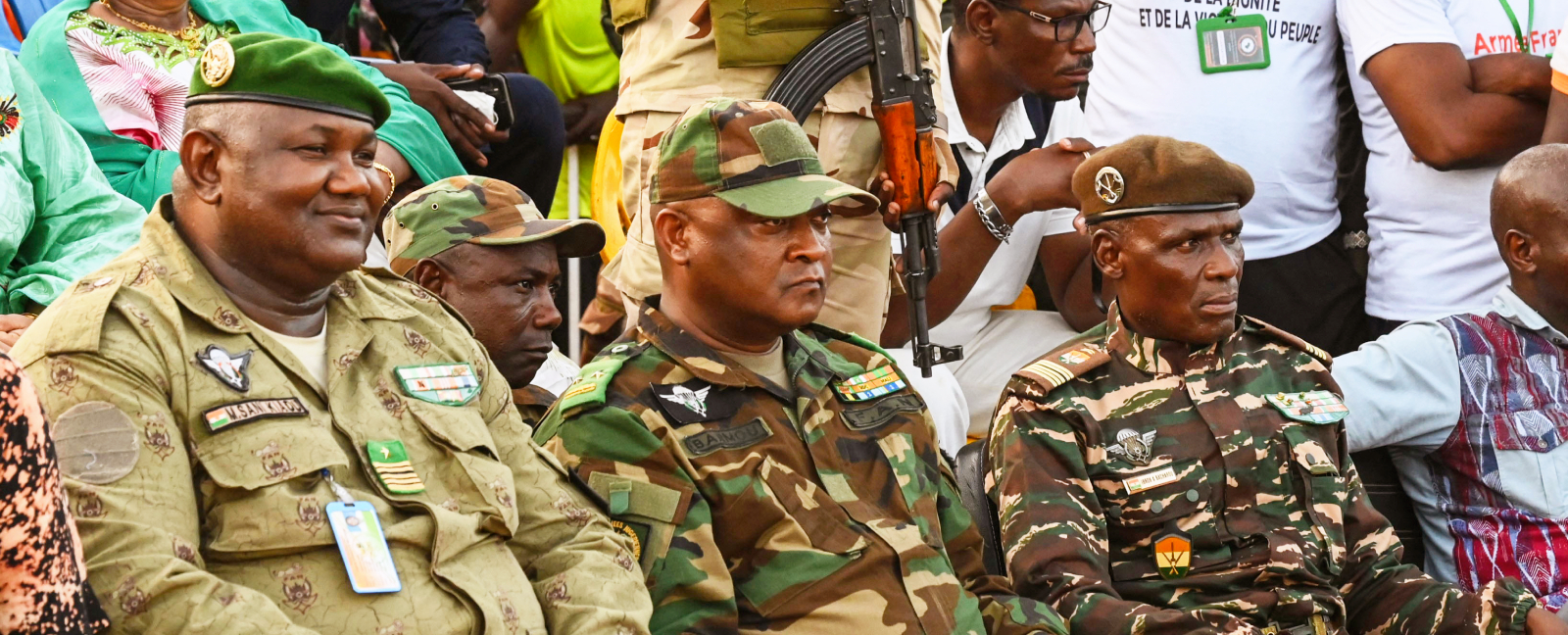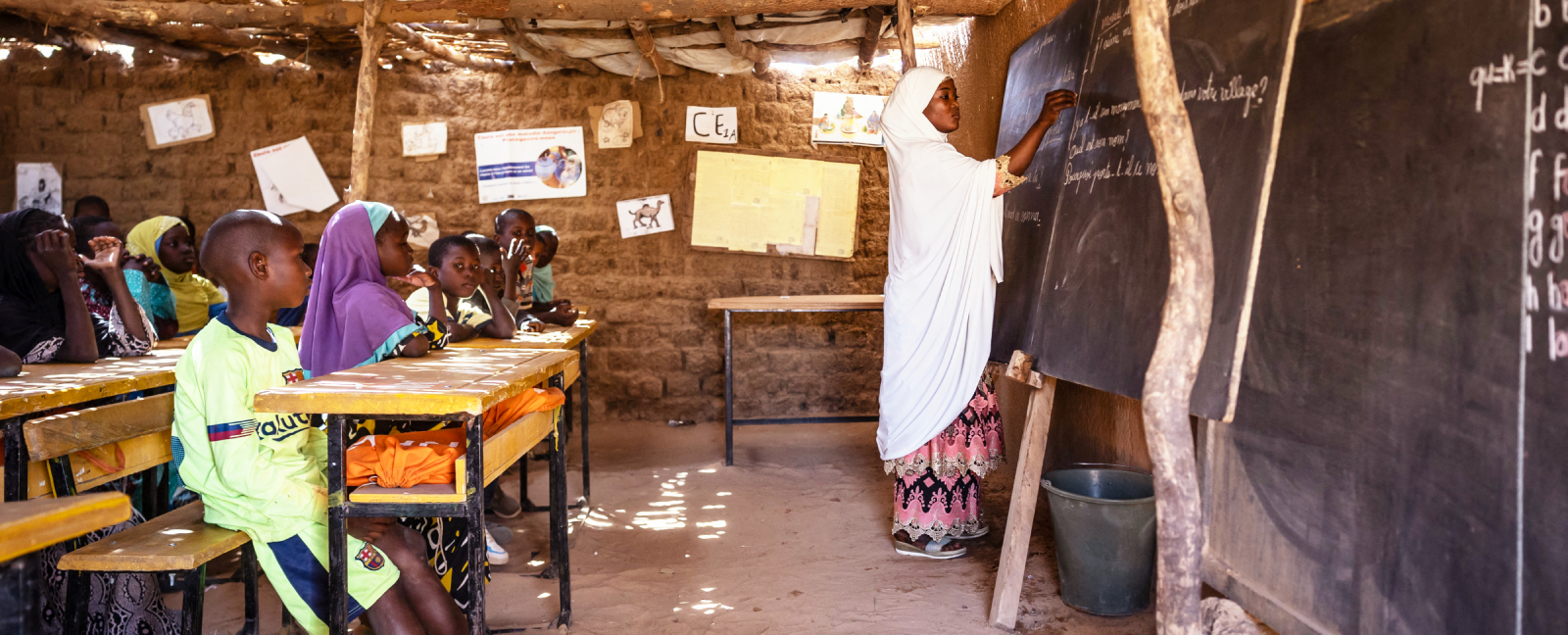
The military coup in Niger has impacted every sector of Nigerien society, demonstrating the centrality of governance to security, economic, and social outcomes. A snapshot of an array of these outcomes reveals a marked shift in Niger’s trajectory since the coup. Despite being one of the poorest countries in the world, Niger had realized discernable progress in the decade prior to the coup under democratically elected Presidents Mahamadou Issoufou and Mohamed Bazoum. Many of those gains have since been upended. With tightening restrictions on the media and information space under the junta, the full extent of this deterioration is difficult to ascertain. This reversal in trajectory will have wider ramifications for the region given that this historically peaceful, landlocked country of 25 million people shares borders with seven neighbors.
Stability Indicator: Security
Pre-Coup Democratic Leadership
- Fatality rates linked to militant Islamist group attacks in Niger declined by 53 percent in 2023 relative to 2022, prior to the coup.
- Military expenditures increased 64 percent under Bazoum—to $309 million in 2023.
- Disarmament and deradicalization programs were encouraging defections from violent extremist groups in the Sahel.
- In the Southeast, where Niger has faced threats from Boko Haram, there were no violent events between 2021 and 2023 and displaced communities were returning to their villages.
Post-Coup Military Junta
- Fatalities linked to extremist groups are projected to reach more than 1,600 in 2024—a 60-percent increase from 2023.
- At least 8 militant Islamist group attacks have claimed a dozen or more soldiers’ lives since the coup. This is a marked increase in the level of violence against the armed forces not seen since 2021.
- With militant Islamists gaining greater control over key roads to Niamey, the capital is increasingly isolated.
- Disarmament and deradicalization efforts have stalled since the military coup.


Leaders of Niger’s military junta: Colonel Mamane Sani Kiaou (L), General Moussan Salaou Barmou (C), and Colonel Ibroh Bachirou (2-R). (Photo: AFP)
Stability Indicator: Economics
Pre-Coup Democratic Leadership
- In the decade under Issoufou and Bazoum, per capita income in Niger expanded by 26 percent.
- The World Bank had projected economic growth of 7 percent in 2023 and 12.5 percent in 2024.
- Despite global spikes in food prices, Niger had managed to keep its inflation rate at around 4 percent, the lowest in the West Africa Economic and Monetary Union.
- 2022 was Niger’s first year without a single school day lost to strikes from teachers or students.
Post-Coup Military Junta
- The Nigerien junta has already missed four debt payments and has now defaulted on $519 million in debt.
- World Bank-projected economic growth in 2024 is expected to decline by 45 percent from previous estimates.
- Grain prices such as millet, sorghum, corn, and rice had all increased by more than 12 percent since the same period in 2023, with rice experiencing the highest inflation of 35 percent in the country.
Stability Indicator: Democratic Space
Pre-Coup Democratic Leadership
- The election of Bazoum, with 56 percent of the vote in February 2021, was widely seen as free and fair.
- Bazoum succeeded Issoufou, who stepped down after completing his constitutionally limited second term in office, representing the first peaceful transfer of power in Niger’s history.
- This democratic trajectory was emerging from Niger’s long history of military government, including four military coups between 1974 and 2010.
Post-Coup Military Junta
- Within the first week of coming to power, the junta replaced all regional governors in Niger with military loyalists
- A petition signed by dozens of university administrators and academics demanding that the junta return constitutional order and sovereign will of Nigerien people resulted in dismissals and intimidation against signatories by the junta.
- The junta dissolved all local and municipal councils in April 2024, replacing many of them, such as the Mayor of Niamey, with military officials.
Stability Indicator: Independent Media
Pre-Coup Democratic Leadership
- Nigerien investigative journalists were central to exposing the diversion of millions of dollars from military procurement contracts.
- Press freedoms were respected under Issoufou and Bazoum, including some independent media outlets being highly critical of a cybercrime law written during the Issoufou administration that journalists argued were overly restrictive and used to target journalists with defamation suits unfairly.
Post-Coup Military Junta
- Journalists have experienced violence, surveillance, and intimidation since the coup—and have subsequently engaged in self-censorship for fear of arrest and harassment.
- Journalists are regularly detained for reporting on issues deemed threatening to the junta, including renowned investigative journalist Samira Sabou who has exposed defense procurement irregularities and was charged with “disseminating data likely to disturb the public order.”
- In January 2024, the junta shut down the country’s Association Maison de la Presse, an umbrella association for 32 professional media organizations, after it “denounced the interruption of democracy and reminded the military of the respect for fundamental freedoms.”
- Pro-junta groups have attacked and intimidated local and international media crews since the coup.
Stability Indicator: Information Space
Pre-Coup Democratic Leadership
- Niger’s legislators adopted a law on human rights defenders in June 2022 that protected these activists from attacks, reprisals, or unjustified legal restrictions.
- The Council of Ministers approved a 2022 bill amending the Repression of Cybercrimes Law, removing prison sentences for defamation and insults via information systems.
Post-Coup Military Junta
- Since the July 2023 coup, Niger’s digital media platforms have been flooded by Russian-linked networks using coordinated inauthentic techniques to distort the information space about Niger and the junta.
- Very few of the coordinated accounts amplifying disinformation in Niger are based in country.

A school teacher teaches a class at the Sakoira school in the Tillaberi region of Niger. (Photo: AFP/Olympia de Maismont)
Stability Indicator: Transparency
Pre-Coup Democratic Leadership
- Audits of the security sector in 2020 found $120 million of unaccounted-for procurement spending (40 percent of budgeted expenditures between 2017 and 2019.
Post-Coup Military Junta
- In February 2024, the junta revoked oversight laws that require transparent accounting of the defense sector.
- Government and junta leaders are reported to be facilitating artisanal gold smuggling to the United Arab Emirates.
Stability Indicator: National Sovereignty
Pre-Coup Democratic Leadership
- Negotiations with mining firms under Bazoum for better terms for Nigerien citizens created millions of dollars in additional education and social investments.
Post-Coup Military Junta
- Indicative of the Russian tactic of reflexive control, whereby one state actor causes another to make decisions to its own detriment by providing carefully selected information, the junta has taken decisions that undermine Niger’s security, economy, and sovereignty. This includes undermining Nigeriens’ democratic voice and agency.
- The junta has reportedly agreed to pay for the deployment of the Russian Africa Corps troops in cash and by granting mining rights to Nigerien gold mines at what junta leaders have characterized as a “high cost” to Niger.
Additional Resources
- Africa Center for Strategic Studies, “Assessing Mali’s Non-Transition,” Infographic, February 2, 2024.
- Africa Center for Strategic Studies, “Attempted Coup in Niger: Backgrounder,” Spotlight, July 27, 2023.
- Dan Kuwali, “Oversight and Accountability to Improve Security Sector Governance in Africa,” Africa Security Brief No. 42, Africa Center for Strategic Studies, September 2023.
- Africa Center for Strategic Studies, “Burkina Faso Crisis Continues to Spiral,” Infographic, August 29, 2023.
- Joseph Siegle, “The Creeping Loss of African Sovereignty,” Spotlight, Africa Center for Strategic Studies, February 8, 2023.
More on: Democracy Disinformation Russia in Africa Sahel

